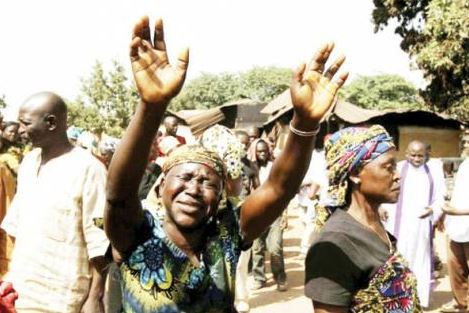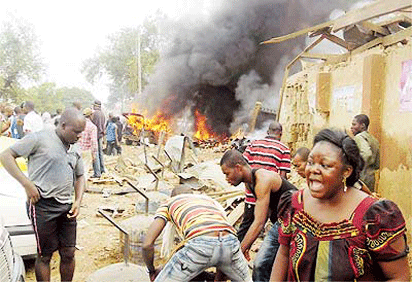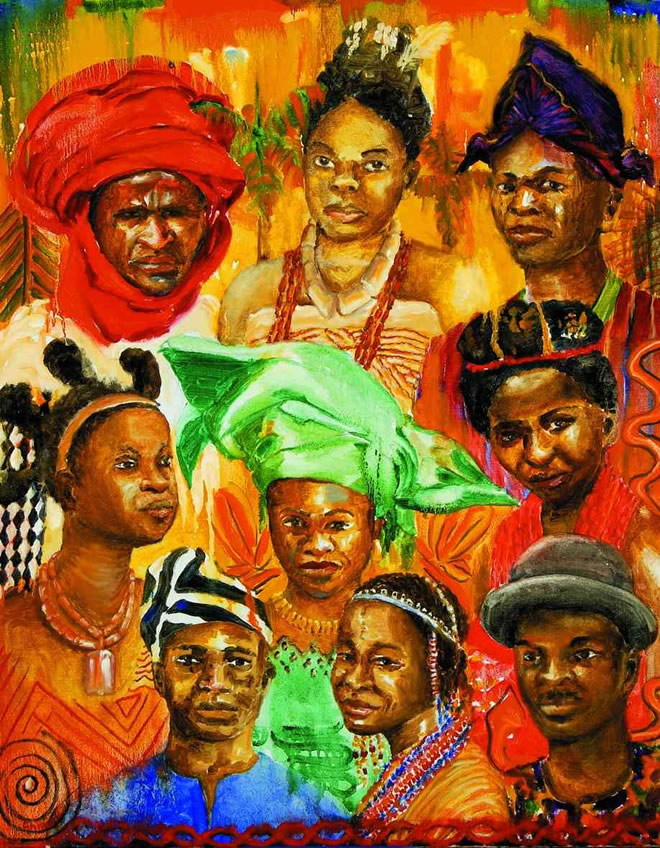This document is prepared by the National Christian Elders Forum (NCEF) to provide information, direction, as well as counsel to leaders of the Christian faith in Nigeria. Without the Unity of the Church, it would be difficult for the nation to overcome its travails. The Church is the light of the world and the salt of the earth. Nigeria is presently groping in darkness and it has lost its savor. Only a united Church can pull the nation back from the brink of the precipice and in the process, preserve Christianity for future generations. NCEF urges Christian leaders to patiently go through the contents of this document.
Memorandum - Mediation And Reconciliation
NATIONAL CHRISTIAN ELDERS FORUM (NCEF) |
MEMORANDUM |
TO |
CHRISTIAN ASSOCIATION OF NIGERIA |
MEDIATION AND RECONCILIATION |
12-Jan-17 |
RESTRICTED CIRCULATION… Based on the sensitivity of the issues under consideration, the National Christian Elders had stressed at meetings in Lagos and Abuja on December 6 and 7, 2016, that as much as possible, details of the issues should not be documented. The intention of the Elders was to have a “family discussion” with the CAN Executives and quietly resolve every issue. Unfortunately, the NCEF was given no other choice but to document these issues since there seems to be an intentional design to frustrate mediation and reconciliation in the affairs of the Body of Christ in Nigeria … |
A Different Kind of Christmas - Southern Kaduna Killings and Christmas Period Curfew: A Statement of Deep Concern
On Thursday December 22nd, the Governor of Kaduna State, Nasir El-Rufai, met with President Muhammadu Buhari to secure the President's backing to declare a 24 hour Curfew in three local government areas of Southern Kaduna State namely: Jema'a, Kaura and Sanga. However, it is relaxed to 12 hours on Christmas day. The reason for the curfew is already public news. Nevertheless, the timing is deceptive and the reasons misleading. As a Southern Kaduna citizen, who lives in Plateau State but in touch with what is going on in Southern Kaduna, I am very troubled. The path our Governor is pursuing will not lead to peace but more animosity, nurturing distrust laced with security miss-steps. My concerns are three-fold:
CAN Declares Jan. 8 2017, National Day of Mourning ...Over Southern Kaduna Killings
To: All Christians in Nigeria and Diaspora.
Gentlemen of the Press,
I bring you greetings in the precious name of our Redeemer and Savior Jesus Christ, Amen. I have been directed by the President of the Christian Association of Nigeria (CAN) Rev. Dr. Samson Olasupo A Ayokunle to bring to your attention the on-going ethnic/religious cleansing of Nigerian Christians in general and those of southern Kaduna in particular in the last few weeks.
Southern Kaduna: Ethnic Cleansing or Struggle for Pasture Land?
Official Position Of The Nigeria Christian Graduate Fellowship On The Southern Kaduna Genocide/Ethnic Cleansing
The recent attacks and sacking of many communities in southern Kaduna, Kaduna State by the Fulani herdsmen raises these pertinent questions; Are the attacks motivated by quest for pasture land or are they motivated by quest for ethnic cleansing/genocide?
If the answer to the first question is positive, one would like to see a situation where the herdsmen graze on their lands and then pass on to other greener pastures.
Hold El-rufai Responsible for the Killings in Goska Village, Jema'a LG, Kaduna State
Once again the Southern Kaduna Peoples' Union (SOKAPU) has had to painfully send out condolences to the murdered people of Goska village in Jema'a Local Government Area of Kaduna State. Ironically, on a day that our people ought to be joyously celebrating the Christmas festivities, was the day they were reduced to burying their loved ones, treating the wounded in hospitals and coping with a fresh batch of internally displaced people of Goska village whose houses were burnt down.
Enough of the Bloodshed: Press Release From the Catholic Diocese of Kafanchan, Kaduna State, North West, Nigeria
PREAMBLE
We, the Clergy, Religious and Laity of the Catholic Diocese of Kafanchan, welcome you to the Cathedral of St Peter Clavers. We are here to present to the world, the pains, agony and sorrows that have befallen us in this part of the State, the Southern Senatorial Zone of Kaduna State. Unfortunately, this crisis of tremendous proportion is happening at the time when, our Chief Shepherd, Most Rev Joseph Bagobiri is far away, outside the shores of this country attending to his health.
CAN opens up on El-Rufai controversial bill: Our position not changed – Secretary
Christian Association of Nigeria, CAN, Kaduna State chapter, has opened up on the Court case between Governor Nasir El-Rufai and Pentecostal Fellowship of Nigeria, (PFN) Church, on the controversial executive bill before Kaduna State House of Assembly, saying, its position is neither hidden nor changed.
Speaking to our correspondent in an interview, the State Secretary of CAN, Sunday Ibrahim, said the position of the Association is very clear and unhidden about the executive bill seeking to regulate religious activities in the state.
Why Nigerian Christians Must Unite
BY SOLOMON ASEMOTA SAN,
CHAIRMAN, NATIONAL CHRISTIAN ELDERS’ FORUM (NCEF)
Introduction
Most Nigerians especially adherents of Christianity and Islam believe that the Berlin Conference of 1885 which partitioned Africa and the British government that in 1914 amalgamated the two Nigerias, both served as the two arms of God to bring Nigerians (indigenes and Arab immigrants) together as one people united for peace, harmony and progress and destined Nigeria to become the giant and light of Africa.
Sharia Creeping Stealthily All Over Into Nigeria
SHARIA BILL
12 states in the Northern part of Nigeria have been practising one form or the other of Sharia law since 2012. These states are Zamfara, Kano, Sokoto, Katsina, Bauchi, Borno, Jigawa, Kebbi, Kaduna, Niger and Gombe.
However, the Nigeria 1999 constitution restricted the role of Sharia to only civil matters involving consenting Muslims.
In a very suspicious and clandestine manner, the whole country woke up one day to learn that a bill enforcing and expanding the role of Sharia had been introduced in the House of Representatives.
Christian Suit Against Sharia
RE-SUIT NO. FHC/ASB/11/CS/2016 –
DR NWANKWO TONY NWAEZEIGWE
VS.
PRESIDENT OF THE FEDERAL REPUBLIC OF NIGERIA AND FOUR OTHERS:
Prof Ben Nwabueze SAN and Solomon Asemota SAN Lead the Plaintiff as Case is Transferred to Abuja
We were informed in Court today 19th of October, 2016 by the presiding learned Judge of the Federal High Court 1, Asaba in Suit No. FHC/ASB/11/CS/2016––Dr Nwankwo Tony Nwaezeigwe vs. President of the Federal Republic of Nigeria and Four Others, that he could no longer be in charge of the matter. His decision as we were informed was that all the defendants in the case are resident outside Asaba. Consequently, the matter was transferred to Abuja for Hearing at a date to be announced later by the yet to be assigned learned Judge.
THE FORCED MARRIAGE OF NIGERIA: Lagos, the Original Lady of Means
Click here to Download Full Document
The title of my presentation is derived from the speech at a Colonial Service Dinner in 1913 by Lord Harcourt the then Secretary of State of the Colonies, (after whom Port Harcourt was named). He summarized in a humorous metaphor, the dependence of Northern Nigeria on the British Treasury for sustenance, when he said:
“we have released Northern Nigeria from the leading strings of the Treasury. The promising and well-conducted youth is now on an allowance “on his own” and is about to effect an alliance with a Southern Lady of means. I have issued the special license and Sir Frederick Lugard will perform the ceremony. May the union be fruitful and the couple constant! The Nigerias are not designed to be a great “Trust” but a great “Federation”.[1]
I shall attempt, within the short time and space available, to examine whether after 102 years of this “marriage”, Nigeria has been “fruitful”, “constant” and, above all, a great “Trust” or a great “federation” I will leave you to decide whether the marriage has failed in any or all the aspirations enunciated by Lord Harcourt.
Press Release - Sultan Announce Eid el-kabir Sept 2016-
IS THE FEDERAL GOVERNMENT ABDICATING ITS RESPONSIBILITY?
Following the controversy that surrounded the extension of the Eid el-Fitri Public Holiday by the Sultan of Sokoto, Alhaji Sa’ad Abubakar III in July 2016, we are amazed that there has been an escalation of the impropriety. According to Vanguard Newspaper Report of 3rd September, 2016, “Sultan of Sokoto, Alhaji Sa’ad Abubakar III, has announced Monday, Sept. 12 as the Eid-El-Kabir Day, … This is contained in a statement signed by Prof. Sambo Junaidu, Chairman, Advisory Committee on Religious Affairs, Sultanate Council of Sokoto” (http://www.vanguardngr.com/2016/09/sultan-announces-monday-sept-12-eid-el-kabir-day/)
Nigeria Constitutionally Is A Secular Not Multi-Religious Country: Factually It Is An Islamic State
Introduction
The Saturday Guardian, August 20, 2016, had the front page captioned “Nobody Can Islamize Nigeria, says Sultan”. The main story on page two of the paper with another caption, “Nobody Can Turn Nigeria to Islamic State” reads: “The Sultan of Sokoto has told Nigerians to forget the fears or suspicion of a grand plan to turn Nigeria into an Islamic State.” Abubakar pointed out yesterday, that it is impossible for a multi-religious country like Nigeria to be converted into a monolithic religious state.”
The Invasion and Destruction of Lives at Kodomun Town by FULANI Herdsmen
It is with a heavy heart that the Bwatiye Community represented by our umbrella organization, *PENE* *DA* *BWATIYE* wish to address you today. We draw attention to the massive destruction of the rural town of Kodomun in Demsa Local Government of Adamawa State and the brutal cold blooded murder of twenty five (25) persons comprising our revered elders, young and middle aged men, women and children. As we address you today, the entire population of about 2,500 inhabitants are now homeless and scattered in towns and villages as Internally Displaced Persons.
PRESS CONFERENCE CONVENED BY PENE DA BWATIYE ON THE INVASION AND WANTON DESTRUCTION OF LIVES AND PROPERTIES AT KODOMUN TOWN IN DEMSA LOCAL GOVERNMENT AREA BY FULANI HERDSMEN AND THEIR HIRED MERCENARIES BETWEEN FRIDAY 29TH JULY, 2016 TO MONDAY 1ST AUGUST, 2016
Gentlemen of the press,
It is with a heavy heart that the Bwatiye Community represented by our umbrella organization, *PENE* *DA* *BWATIYE* wish to address you today. We draw attention to the massive destruction of the rural town of Kodomun in Demsa Local Government of Adamawa State and the brutal cold blooded murder of twenty five (25) persons comprising our revered elders, young and middle aged men, women and children. As we address you today, the entire population of about 2,500 inhabitants are now homeless and scattered in towns and villages as Internally Displaced Persons.
Please recall that from January to July this year, similar mass killings took place in the Bwatiye villages of Koh, Goron, Ndikajam, Tabongo, No-Ine Fawaire and Jimoh in Girei Local Government Area of Adamawa State where seventy two (72) deaths were recorded including the Divisional Police Officer (DPO) of Vunoklang, a suburb of the Jimeta metropolis. These killings were perpetrated by suspected Fulani Herdsmen and their hired mercenaries. Up to this time, no one, to the best of our knowledge has been questioned or sanctioned by the authorities over the incidence and no compensation to the victims.
As painful as the destruction and looting of property and the brutal killings of our defenceless people and the removal of some vital parts of their bodies for ritual purposes have been, we have managed with difficulty, to implore our communities to refrain from taking the law into their own hands. While we continue to look up to the State Government for justice and protection, unfortunately, government failed in this regard. We find this failure of government unacceptable, as it is equally becoming more challenging to restrain our people from rising up to their own self defence by every possible means against armed Fulani herdsmen that are using assault riffles and hard core military weapons, as didi in Koh, Ndikajam, No-Ine, Tabongo Goron, Fawaire and Jimoh in Girei Local Government Area.
The impunity of these invaders will not stop unless the government ceases to treat them with kid gloves. We are gratified that the president of the Federal republic of Nigeria, President Muhamamdu Buhari has at last directed the security agents to disarm them. However, we wait to see what will happen, for with the likes of commissioner of Police of Adamawa State as law enforcement officers, we will be faced with either inaction or complicity. You will recall that this Commissioner of Police on Tuesday 2nd August, 2016 said no life was lost in the invasion on Kodomun and that he did not allow his men to intervene in the attack because according to the Commissioner of Police, this was a Communal clash and to do so, would appear to be taking sides. We feel that this man is not fit for Command. He should be removed immediately by the Inspector General of Police. In light of the foregoing, we unequivocally affirm that it is not a coincidence that the brunt of these murderous attacks have been directed mainly at the ethnic nationalities and other well meaning citizens who are opposed to this diabolic agenda. The activities of these evil men is not limited to the Bwatiye alone, it is rather a carefully calculated and orchestrated agenda by these dangerous external Fulani Marauders in collaboration with their local herdsmen and sponsors to lay state, sack and take over the fertile agricultural lands of the indigenous groups.
First they struck in Dumne and massacred several Yungur people. In 2012, they invaded Lamurde LGA and touched several of the Sobo settlements through a highly sophisticated mercenary force whose advance was only checked through the late intervention of a combined team of police and military troops.
Between 2010 - 2014, through the diabolic Boko Haram sect, these blood thirsty organizations laid waste to the largest concentration of ethnic nationalities in Yobe, Borno and Adamawa States destabilizing in the process the Marghi, Higgi, Fali, Gude, Janyi, Kilba, Hona, Lala, Bura, Ga'anda, Mboi, to name a few. The strategy they employed is a simple one isolate the different ethnic nationalities and strike them at will. They started this in Plateau State, then moved to Nasarawa and Benue States. They have laid siege to Kogi, Ekiti, Ondo, Enugu, Delta, Taraba, Kaduna, Zamfara, Nasarawa States etc. This is therefore, a wake-up call on all and sundry to stand up and fight this common evil by all well meaning and peace loving Nigerians.
*OUR* *DEMANDS*
1. That, as a matter of priority and urgency, government should immediately come to the aid of the victims of the Kodomun massacre through the provision of relief materials. Government should also rehabilitate and settle the affected community as houses and property have been destroyed and they could hardly afford to provide shelter for themselves. 2. We as a people have a well known attribute of love for peace and good communal life with all people who seek sojourn in Bwatiye land. We would cooperate with Government in finding ways to ensure that justice is done through the CONSTITUTION OF HIGH POWERED JUDICIAL PANEL OF ENQUIRY with task to ascertain the true position of the immediate and remote causes of all these deadly attacks on innocent and defenceless people, in all cases by surprise in their sleep, on their farms or as in the case of Kodomun as the people gathered to bury their dead. We call on the government of Adamawa State, His Excellency Mohammed Umaru Jibrilla to take this important step to provide a permanent settlement to the raids and feuds in the interest of peace in Adamawa State. 3. We assume government is aware that unless culprits are brought to book, we run the danger of communities resorting to the dreadful steps of securing justice against the tenets of civilized society. The danger is that as no section of the citizenry or ethnic group has a monopoly on violence, other groups will take measures to protect themselves and their property. The result is going to be chaos and disorder in the country beyond the scope of government to control, should it desire to do so at this stage, we call on the government to check this dangerous drift to anarchy. 4. Consequently and more importantly, we demand the immediate disarming of Fulani Herdsmen and immediate proactive steps towards restoring amicable farmers / grazers relationship for the benefit of peace and harmony in Adamawa State. In conclusion, *PENE* *DA* *BWATIYE* *WORLDWIDE* here again calls loudly to all Bwatiye sons and daughters and other ethnic nationalities to inspite of our distress, to keep the faith in the Federal and State Governments, to remain law abiding, respecting all constituted and responsible authority. We appreciate you the media and look forward to your reports. Sign for and on behalf of the Bwatiye Worldwide.
_____________________ *PRINCE* *HEZRON* *A*. *FADA*, National President, Pene Da Bwatiye.
















